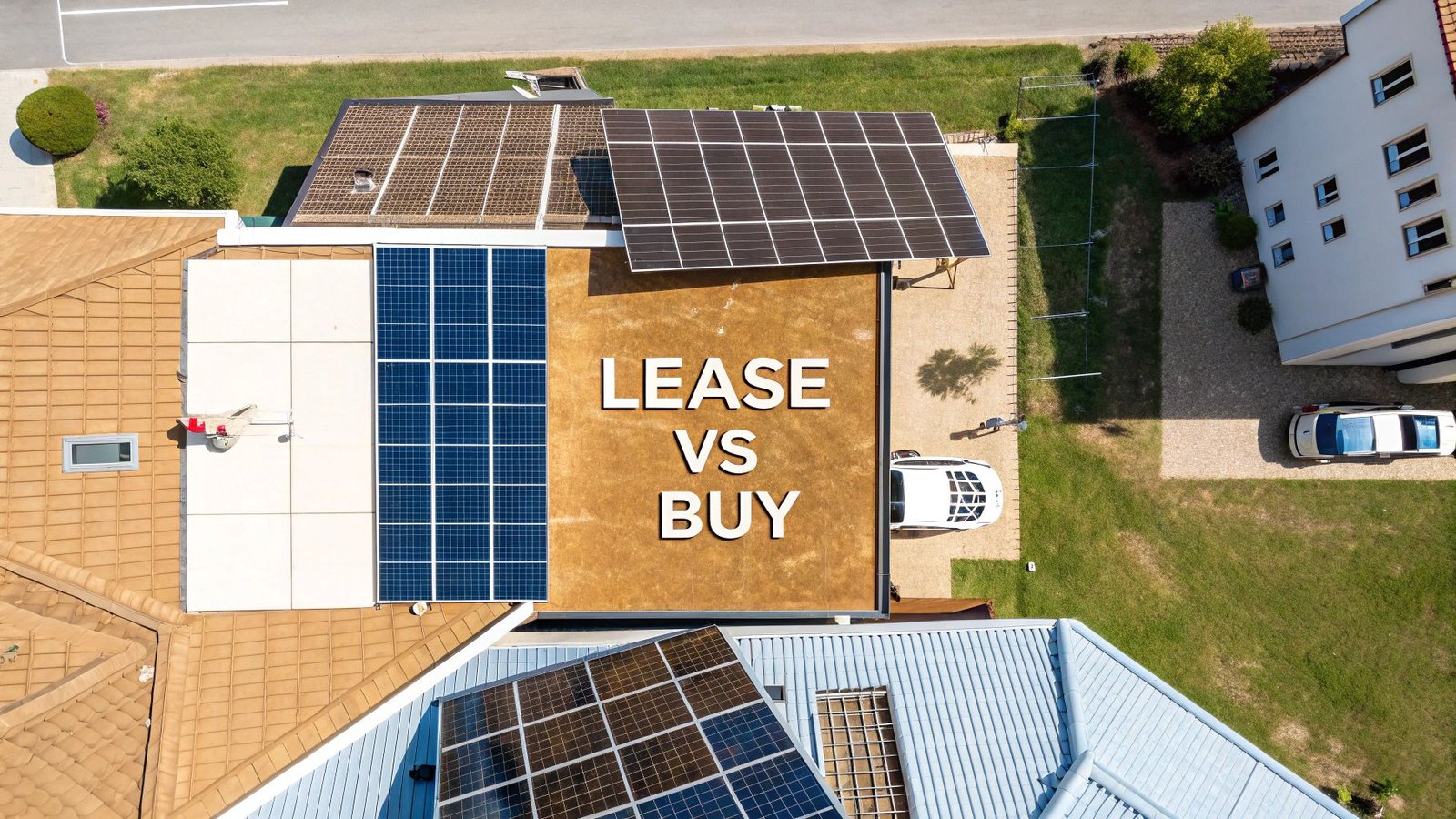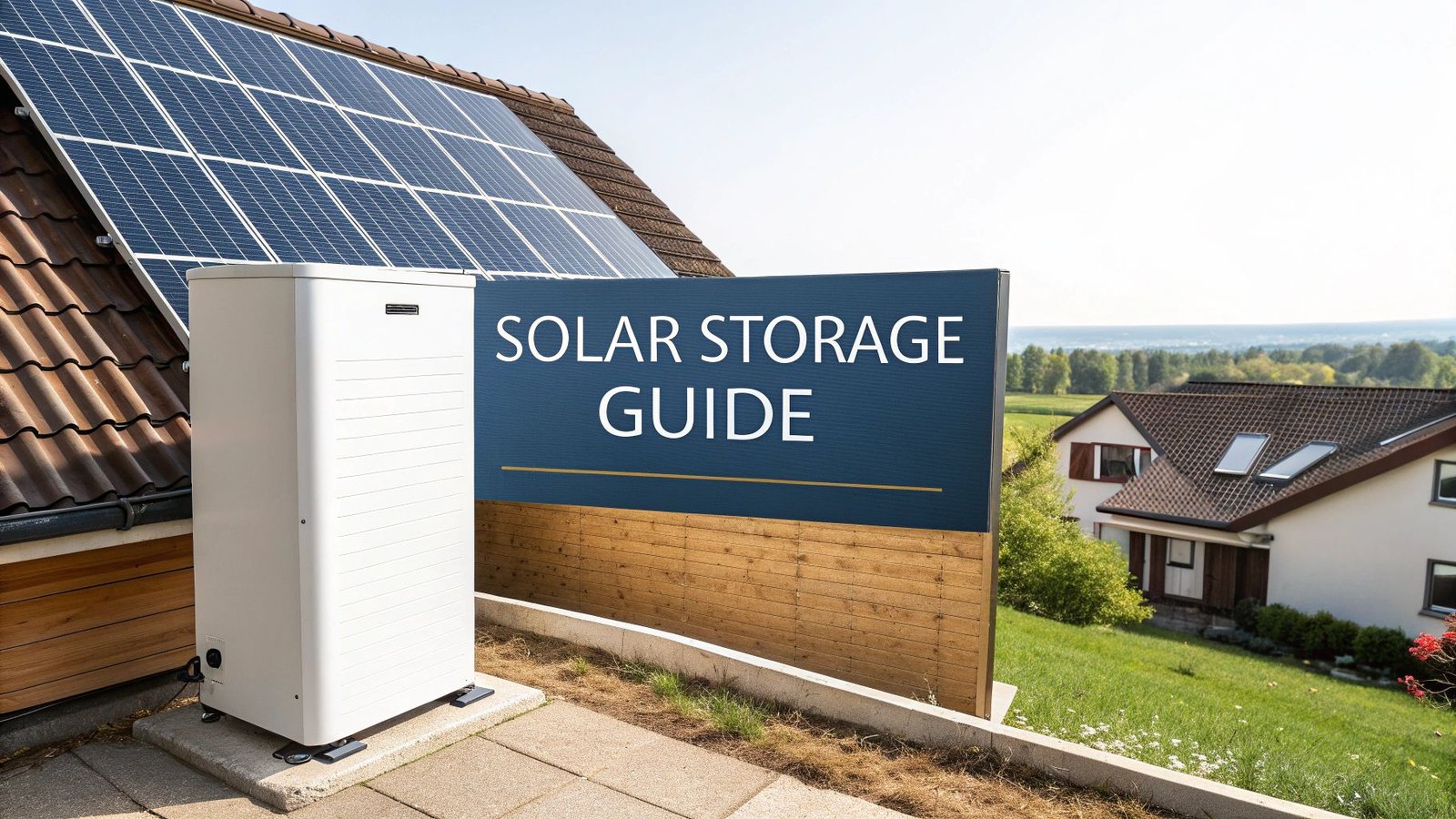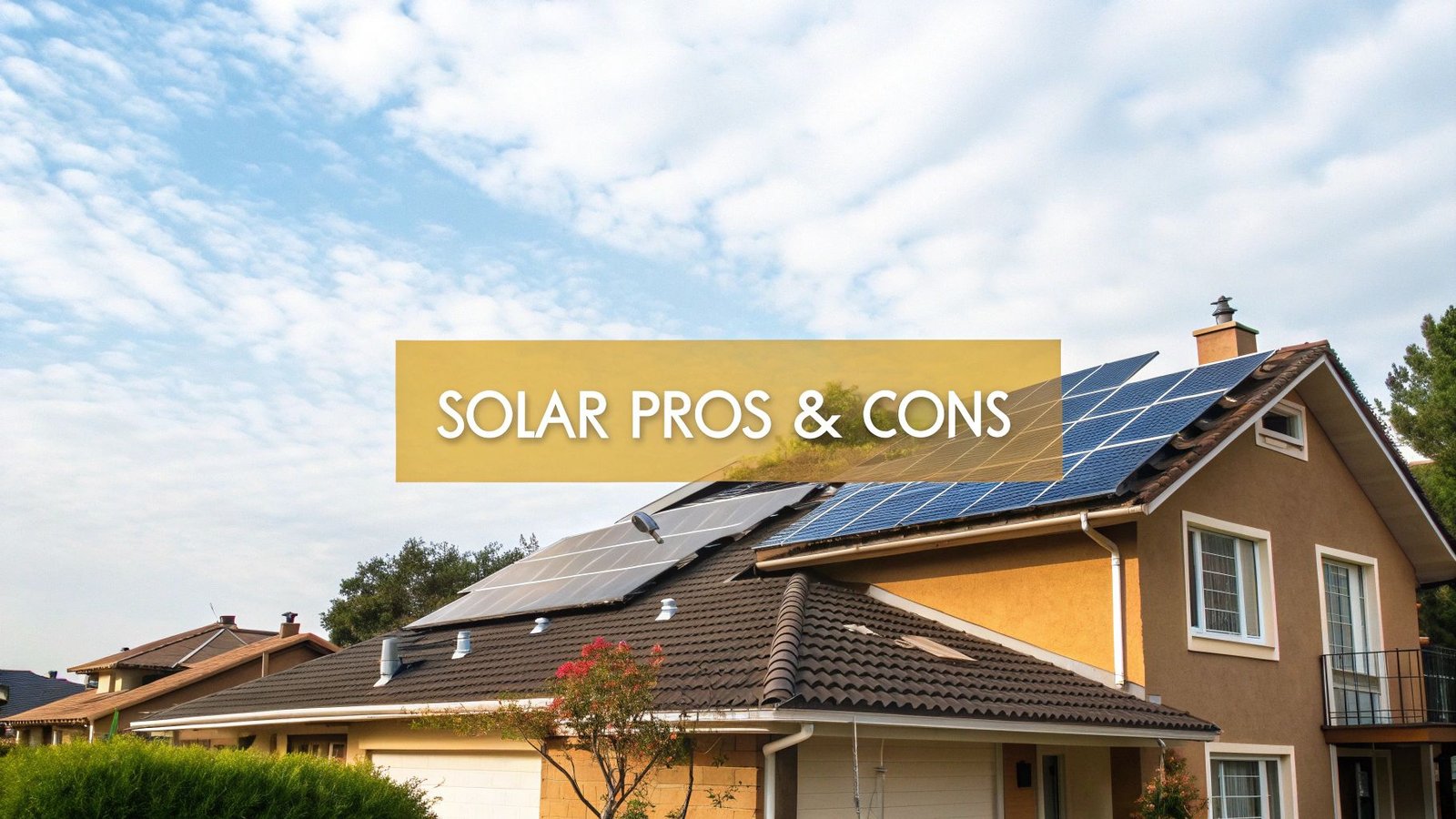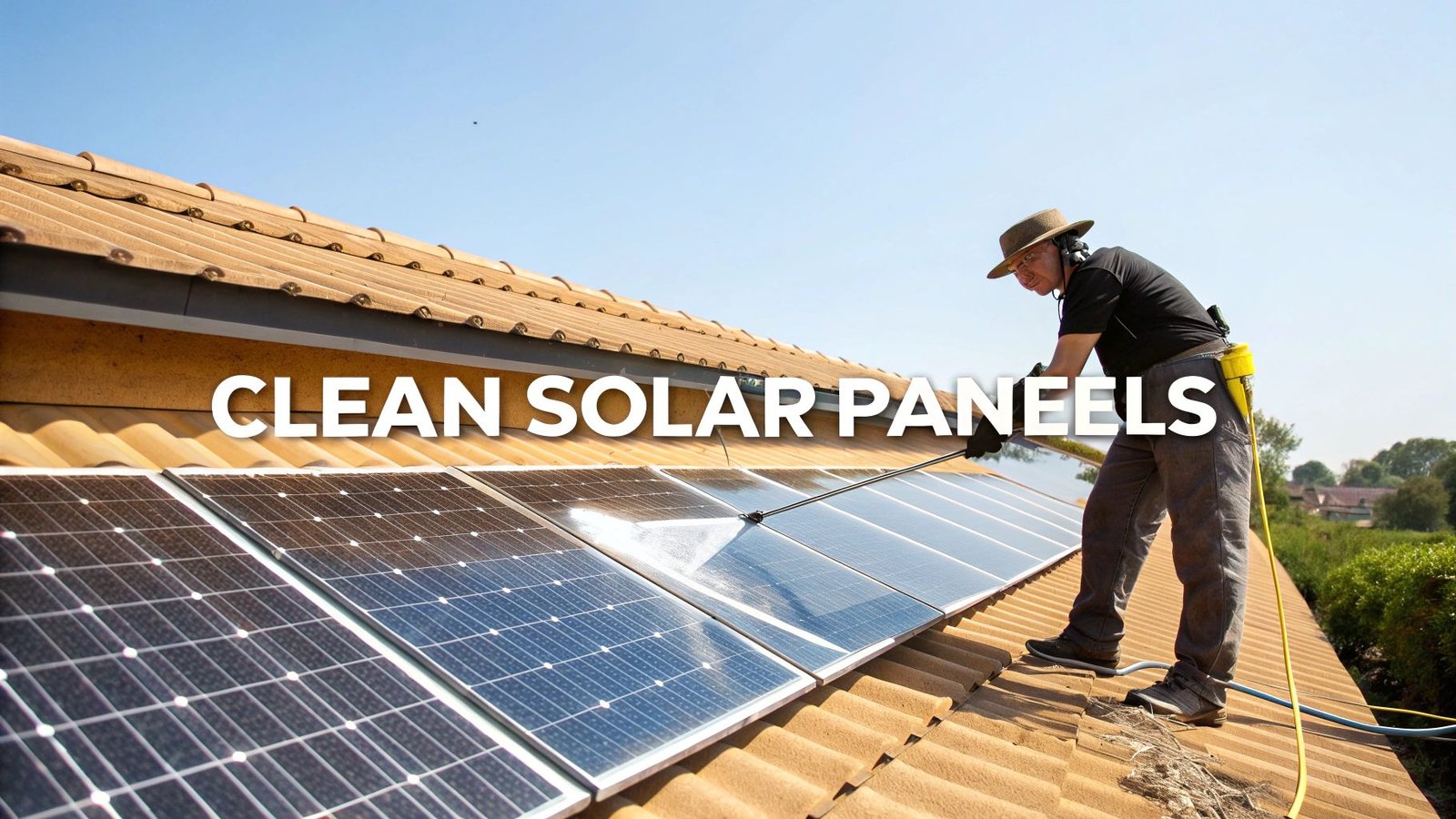When you're trying to figure out the best way to get solar for your home, the choice really boils down to one thing: Buying solar panels is a long-term investment that pays off in big savings and higher home value, while leasing is more like renting power with little to no upfront cost. It all depends on what you value more—the long-term financial win or getting started with solar easily and affordably.
Your Quick Guide to Leasing vs Buying Solar
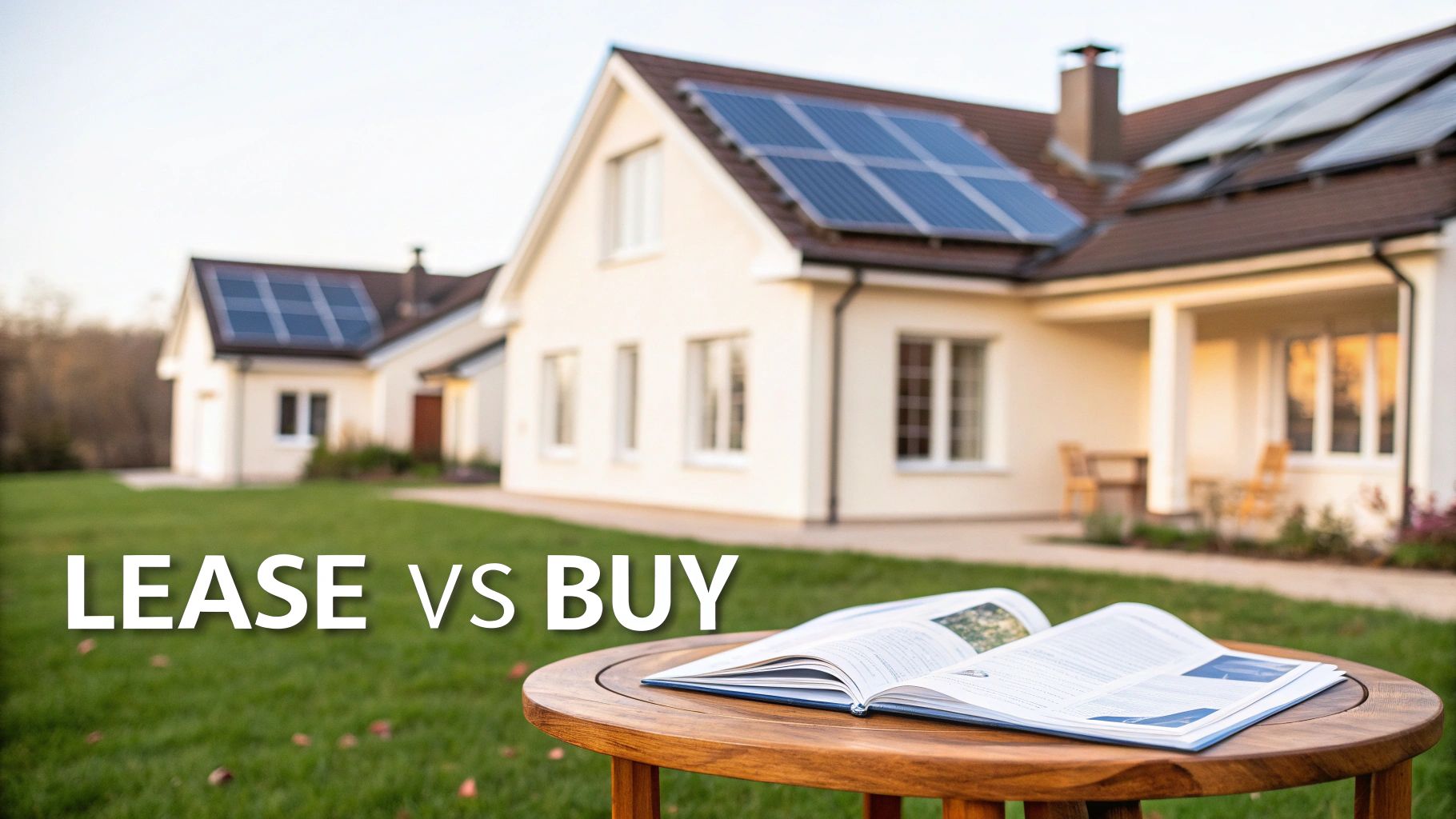
Making the right solar choice can feel overwhelming, but it gets a lot clearer when you understand the two main financial paths. When you buy solar panels, whether you pay cash upfront or take out a loan, you're purchasing an asset. This asset doesn't just produce electricity; it adds real, tangible value to your property. It’s like buying a car—once you pay it off, it's all yours, and so are the benefits.
On the flip side, leasing a solar system (or a similar setup called a Power Purchase Agreement or PPA) is more of a service agreement. A solar company puts their panels on your roof, and you just pay them a monthly fee for the power it generates. To get a handle on the core differences between these acquisition models, it's worth reading up on equipment financing vs leasing for your business.
Lo más importante: The "lease versus buy solar panels" debate is really a question of ownership. Owning the system unlocks valuable tax credits and boosts your home's equity, while leasing offers a simple, low-cost way to start using solar energy without any of the ownership hassles.
Solar Lease vs Buy A Quick Comparison
To help you see the key distinctions at a glance, this table breaks down the fundamental differences between leasing and buying solar panels.
| Factor | Buying Solar Panels | Leasing Solar Panels |
|---|---|---|
| Coste inicial | High (average $15k-$30k), can be $0 with a loan | Typically $0 down |
| Ownership | You own the system as a home asset | A third-party company owns the system |
| Tax Incentives | You claim the Crédito fiscal federal 30% & state rebates | The leasing company claims all tax credits |
| Long-Term Savings | Maximized; full savings after payback period | Lower; fixed monthly payments that may increase |
| Maintenance | Your responsibility (covered by warranties) | Handled by the leasing company |
| Home Value | Increases property value significantly | Does not typically increase property value |
Both options get you on the path to clean energy, but as you can see, the financial implications and day-to-day responsibilities are worlds apart. For anyone wanting to dig deeper into the nuances of third-party ownership, our guide on solar lease vs PPA offers more detail.
The Financial Reality of Upfront Costs and Savings
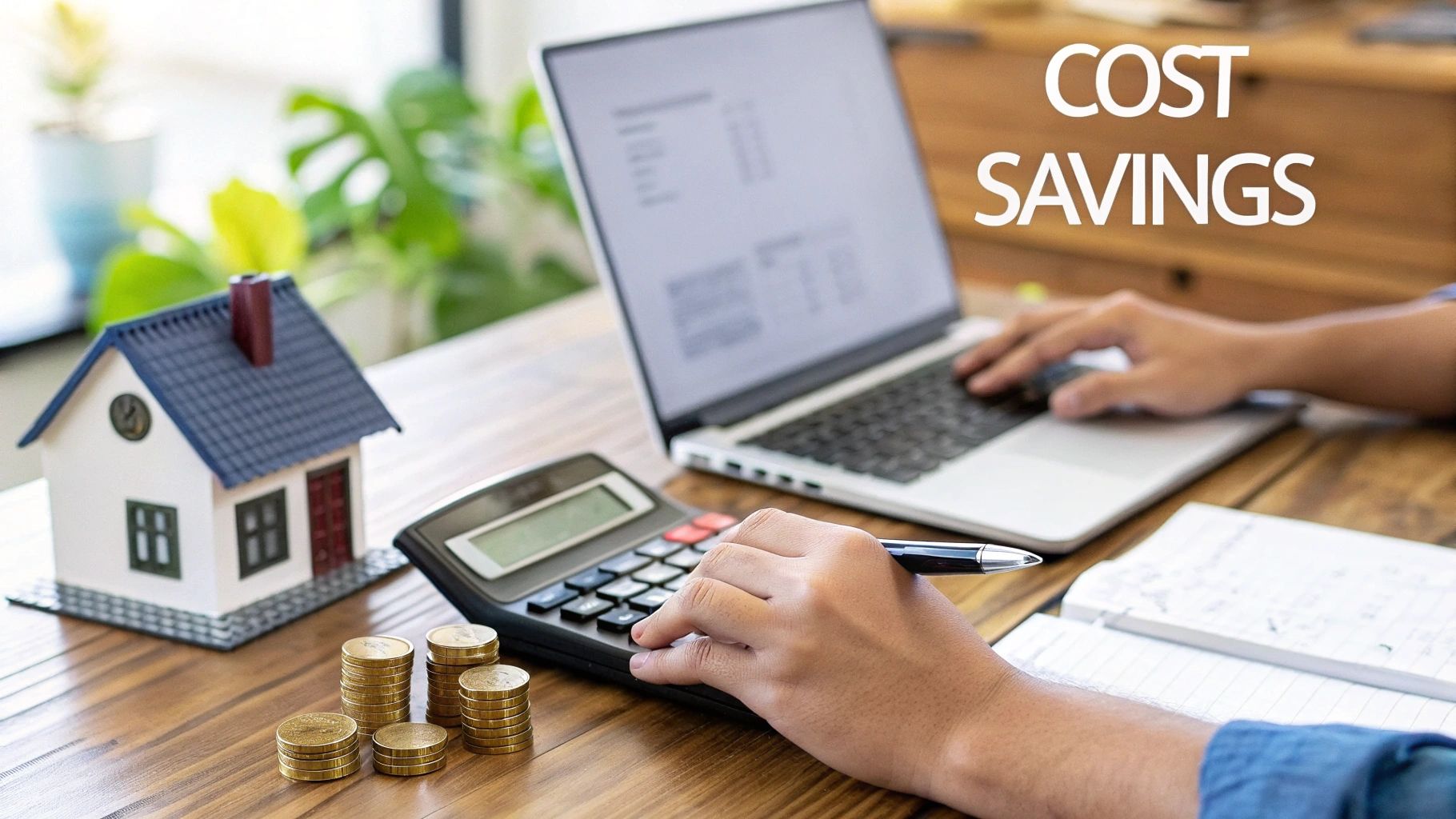
When people ask about leasing versus buying solar panels, the conversation almost always starts with money. And for good reason—the initial financial commitment is where these two paths diverge most sharply. If you buy a solar system, you’re looking at a significant upfront investment. A solar lease, on the other hand, is built to remove that initial barrier, which is why it appeals to homeowners who want savings right away without dipping into their own capital.
Buying solar panels will typically set you back somewhere between $15,000 and $30,000 for an average home system. Compare that to a lease, which often requires little to no money down and instead has a predictable monthly payment, usually in the $50 to $150 range. Historically, purchasing a system means you'll break even in about 7 to 12 years. This payback is accelerated by energy savings and powerful incentives like the 30% federal Investment Tax Credit (ITC).
gantt
title Solar Purchase Payback Timeline
dateFormat YYYY
axisFormat %Y
section Buying a Solar System
Initial Investment :crit, 2024, 1d
Payback Period :2024, 10y
Free Electricity & Savings :after Payback Period, 15y
That initial purchase price covers the whole shebang—panels, inverters, permits, and all the labor. While the sticker shock is real, owning the system means every single kilowatt-hour it generates over its 25+ year lifespan goes directly to your benefit. For a closer look at what goes into that number, our guide on coste de instalación de un sistema de paneles solares breaks it down.
Projecting Your Long-Term Financial Outcome
When you buy, you’re playing the long game. Think of it as an investment with a clear return. Once you pass the payback period, every dollar you would have paid to the utility company is now pure savings in your pocket. It's not uncommon for homeowners to see total net savings exceed $50,000 over the 25-year life of the system, depending on local electricity rates.
Leasing, in contrast, offers more modest but immediate gratification. The deal is simple: your fixed monthly lease payment is designed to be lower than your current electric bill, giving you instant savings. But there's a catch you absolutely have to watch for in the contract: the price escalator clause.
An annual price escalator, usually set between 1% and 3%, means your monthly lease payment goes up every single year. Over a 20-year contract, those seemingly small bumps can eat away at your long-term savings, making the deal far less attractive than it first appeared.
A Lifetime Cost Comparison
Let's lay out the financial journey over a quarter-century to really nail down the lease versus buy solar panels debate.
- Buying: You start with a high initial cost, work through a payback period, and then enjoy Más de 25 años of free electricity and significant financial returns.
- Leasing: You start with no upfront cost but commit to 20-25 years of monthly payments that will likely increase each year, leading to more moderate overall savings.
The graph really tells the story here. While leasing gives you a flat, predictable cost, the financial upside of buying just keeps climbing once the system has paid for itself. The long-term net gain is just in a different league.
Ultimately, your choice boils down to what you prioritize financially. Buying is a true investment aimed at maximizing your return, while leasing is a service designed to minimize your initial expense.
A Side-by-Side Look at the Key Differences
Beyond the dollars and cents, the choice between leasing and buying solar panels really comes down to a few core factors that will shape your entire experience. It's a classic ownership vs. service debate. How you feel about ownership, incentives, and long-term responsibilities will point you toward the right answer for your home and lifestyle.
Think of it this way: buying a system means you're acquiring a powerful home asset, with all the perks and duties that come with it. Leasing, on the other hand, is like signing up for a service where a company installs and manages the equipment, and you just pay for the clean energy it generates.
Who Actually Owns the Panels?
The most critical distinction is who holds the title. When you buy a solar panel system, you own it, plain and simple. It becomes a part of your property, just like a new roof or a finished basement. This direct ownership is what boosts your home's value. In fact, studies consistently show that homes with owned solar panels can sell for a premium of 5-10% more than similar homes without them.
If you lease the system, the solar company owns it. Those panels on your roof are their property, not yours. Because it's a third-party asset tied to a long-term contract, a leased system won't add to your home's appraised value and, as we'll see, can sometimes make a future home sale a bit more complicated.
To help you visualize the core differences, here’s a quick-glance table comparing the most important features.
Lease vs Buy At A Glance: A Detailed Feature Comparison
This table breaks down the essential details, offering a clear side-by-side comparison to help you weigh the most important factors when deciding between leasing and buying solar panels.
| Factor | Buying Solar Panels | Leasing Solar Panels |
|---|---|---|
| Coste inicial | High initial investment, though loans and financing are available. | Typically $0 down or a very low initial payment. |
| Ownership | You own the system outright as a home asset. | En solar company owns the system for the entire term. |
| Home Value | Increases home value and can be a major selling point. | Does not increase home value and can complicate a sale. |
| Tax Credits | You claim the federal solar tax credit and any state/local incentives. | En leasing company claims all tax credits and incentives. |
| Long-Term Savings | Maximum savings over the system's lifetime. | Modest savings on your monthly utility bill. |
| Monthly Payment | A fixed loan payment (if financed) or no payment (if paid in cash). | A fixed monthly lease payment that may have an annual escalator. |
| Maintenance | Your responsibility, but covered by extensive warranties. | The leasing company handles all maintenance and repairs. |
| Selling Your Home | A straightforward process; the system is an asset. | Requires the buyer to assume the lease or you to buy it out. |
This table lays out the trade-offs clearly. Now, let’s dig a little deeper into what these points mean in the real world.
Who Gets to Claim the Tax Credits and Rebates?
Financial incentives are a huge driver for going solar, and who pockets them is a major dividing line. When you buy your system, you are the one eligible for the lucrative federal solar tax credit. This is a big deal—it can dramatically lower your overall cost by reducing what you owe in federal taxes. You also get to claim any state or local rebates that might be available.
With a lease, you sign away your rights to all of these financial perks. The leasing company, as the system owner, is the one that claims the federal tax credit and all other rebates. A good leasing company might pass some of that value on to you through a lower monthly rate, but the direct financial benefit goes to them, not you.
Who Is on the Hook for Maintenance and Repairs?
The question of upkeep is where these two paths really diverge. When you own your solar panels, you’re responsible for their maintenance. The good news is that modern solar systems are incredibly reliable and don't need much attention. For peace of mind, they come with a stack of robust warranties:
- Product Warranty: This covers defects in the panels themselves, usually for 10-25 years.
- Performance Warranty: This guarantees your panels will produce at a certain level for 25-30 years.
- Workmanship Warranty: This protects against any issues related to the installation, typically for 5-10 years.
In a lease agreement, the roles are completely flipped. The solar company is responsible for all maintenance, repairs, and system monitoring. This hands-off approach is a primary reason people choose to lease. It completely removes any worry about potential repair costs or performance dips. If a panel goes down, it’s their job to fix it, not yours.
What Happens When It's Time to Sell Your House?
The decision you make today will absolutely have an impact if you decide to move down the road. Selling a house with an owned solar system is usually pretty simple. It's a valuable asset that you can feature in your listing to attract buyers.
Selling a home with a leased system adds an extra layer to the process. The lease is a long-term contract, often 20-25 years, that has to be addressed. You're left with two main choices:
- Transfer the lease: Your homebuyer has to be willing and financially able to qualify for and take over the rest of your lease agreement.
- Buy out the lease: You can pay a lump sum to end the contract, which often includes a buyout premium on top of what you still owe.
This can sometimes slow things down or complicate negotiations, especially if a potential buyer is hesitant to take on someone else's contract.
How Global Trends Tip the Scales on Your Solar Choice
Believe it or not, your decision to lease or buy solar panels is tangled up in some pretty big global forces. Things happening on the other side of the world—from manufacturing breakthroughs to government policies—have a direct impact on which option makes more sense for you.
Think of it this way: the massive boom in solar panel manufacturing, especially in Asia, has caused hardware costs to plummet over the last ten years. This isn't just a minor dip; it's a fundamental shift that has made buying panels outright a real possibility for millions of homeowners who couldn't have considered it before. The whole financial equation has changed.
Manufacturing and Supply Chains: Why Your Price Tag Keeps Dropping
The global solar supply chain directly affects what you'll pay for a system. As factories get more efficient and technology gets better, the cost per watt of solar power just keeps falling. This downward price trend is a huge win for anyone looking to buy.
graph TD
A[Global Manufacturing Efficiency Increases] --> B{Cost per Solar Panel Decreases};
B --> C[Upfront Purchase Price Lowers];
C --> D[Faster Payback Period];
D --> E[Higher ROI for Homeowner];
When the system itself is more affordable, you hit your payback period much faster and see a bigger return on your investment over the long haul. Sure, leasing companies get those cheaper panels too, but when you buy, those savings land directly in your pocket.
This global manufacturing shift has been a real game-changer. What used to be a daunting upfront cost is now a manageable investment for many families, bringing the incredible long-term financial upside of ownership within reach.
How Government Policies Steer You One Way or the Other
Government incentives are the other major piece of this puzzle, and they are wildly different depending on where you live. In the United States, for example, leases and Power Purchase Agreements (PPAs) really took off because they offered a way to go solar with zero money down.
But if you look at places like Australia or Germany, a different story unfolded. Their governments offered powerful cash rebates and feed-in tariffs that made buying the clear, no-brainer choice for almost everyone.
This really shows how policy can nudge an entire market in one direction. The U.S. model built a huge industry around third-party ownership, while other countries pushed for direct ownership from day one. These trends shape not just how many people go solar, but also what kind of financial benefits they see. You can read more about how global solar capacity continues its rapid expansion.
So, as you’re weighing the lease vs. buy debate, just remember that the options on your table were shaped by these international currents. Lately, even in the U.S., the tide has started to turn in favor of buying as incentives change and panel prices stay low, giving homeowners more power than ever to own their energy future.
Which Solar Path Is Right for Your Situation?
Deciding between leasing and buying solar panels isn't just a numbers game—it's about matching the right financial model to your life. To get past the generic pros and cons, let's look at four common types of homeowners. This way, you can see where you fit in and align your choice with your personal goals, budget, and future plans.
This infographic gives a good overview of how different global factors and government policies can shape solar trends, which in turn can affect your decision.
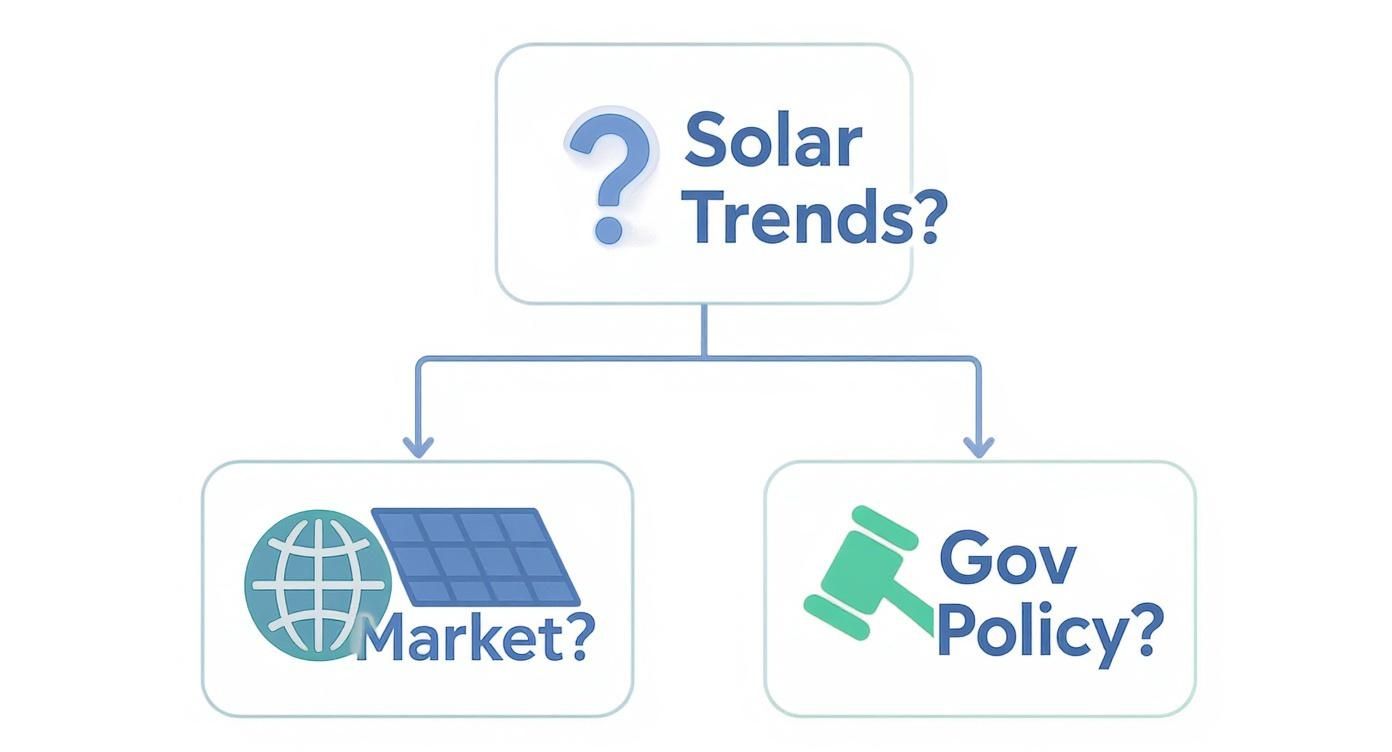
Think of it as a decision tree—international markets and local policies can create clear advantages for either leasing or buying, depending on where you live.
The Long-Term Investor
If you view your home as a core part of your investment portfolio and have the cash (or access to a good loan), buying your solar panels is a no-brainer. You're playing the long game, aiming to squeeze every drop of value out of the system's 25 años lifespan. Ownership means you pocket all the financial perks: the Crédito fiscal federal 30%, a real boost in home equity, and decades of savings once the system has paid for itself.
The goal here is the lowest possible lifetime cost of energy, and owning is the only way to get there. It’s a strategy that treats solar as a valuable asset that will pay you back for years.
The Verdict for Investors: Buy. You're focused on building long-term wealth, and owning your solar system delivers the biggest financial payoff. This approach literally turns your roof into a money-making asset.
The Budget-Conscious Homeowner
For anyone who needs to see savings on their utility bill immediately without draining their bank account, leasing is a fantastic fit. Your main priority is cutting monthly expenses right now. Most solar leases and Power Purchase Agreements (PPAs) come with a $0 down option, giving you a predictable, lower electricity payment from the get-go.
You're essentially trading the long-term financial rewards of ownership for immediate relief on your bills. It's a low-risk, low-commitment way to get into solar. And once you start thinking about solar, you might find other interesting applications, like solar powered vehicle options.
The Short-Term Resident
What if you see yourself selling your home in the next five to seven years? This is where things get a bit more interesting. Even in this scenario, buying is usually the better call. Owned solar systems have been shown to increase a home's value and can be a huge selling point for potential buyers. It's a clear, tangible asset you can pass on.
A lease, on the other hand, can sometimes throw a wrench in a home sale, as the new buyer has to qualify for and agree to take over the contract. If you know a move is on the horizon and want to avoid any potential snags at the closing table, you might wait on solar or look for a lease with extremely flexible transfer terms.
The Hands-Off Consumer
Do you just want the benefits of solar without any of the work? If convenience and a hassle-free experience are at the top of your list, then a solar lease was practically designed for you. When you lease, the solar company is on the hook for everything: monitoring, maintenance, repairs, and insurance. All you do is pay for clean energy.
You're consciously trading maximum financial return for total peace of mind. If a panel stops working or an inverter dies, that's their problem to fix, not yours. This "set-it-and-forget-it" approach is ideal for anyone who wants to go green without taking on the responsibilities of a system owner.
Making Your Final Decision with Confidence
https://www.youtube.com/embed/BtY9Nmm2z0U
So, what’s the right move for you? When it comes down to leasing versus buying solar panels, your final choice really boils down to your financial goals and what you value most.
Buying is, without a doubt, a powerful long-term investment. It's about more than just energy savings; you're actively boosting your home's equity. Leasing, on the other hand, is the fast track to solar savings, perfect for anyone who wants to skip the high upfront cost and avoid the hassle of maintenance.
The numbers tell a compelling story for ownership. We see homeowners who buy their systems add $15,000–$20,000 to their property value. Plus, they get to pocket the Crédito fiscal federal 30%, a significant financial perk that lessees simply can't claim. You can dive deeper into the financial side by exploring global PV market trends and their impact.
Final Verdict: Buy if you’re playing the long game and want the best possible return on your investment. Lease if your priority is saving money right now with zero down and zero maintenance headaches.
Curious what ownership could look like for your specific situation? Plug your numbers into our solar return on investment calculator to get a personalized estimate.
Got Questions About Solar? We've Got Answers.
Here are some of the most common questions we hear from homeowners trying to decide between leasing and buying solar panels. Let's tackle the issues that really matter when you're making this big decision.
Will a Solar Lease Complicate Selling My House?
This is a big one. When you sell a home with leased solar panels, you're not just selling the house; you're also dealing with the solar contract. The leasing company still owns the system on your roof, so that agreement has to be settled before you can hand over the keys.
Usually, this means one of two things: either the new buyer agrees to take over the lease (and they have to qualify for it), or you have to buy out the rest of the contract yourself. It adds an extra layer to the sale.
On the flip side, selling a home with a system you own is much simpler. The panels are part of the property, a tangible asset that can boost your home's value. It becomes a straightforward selling point, not a negotiation hurdle.
The Bottom Line: An owned system is a clear asset. A leased system brings a contract into the mix, which can sometimes make the sales process a little trickier.
What Happens When My Solar Lease Is Up?
Once your 20- to 25-year lease term is over, you’ll have a few paths to choose from. First, you can simply renew the lease. The company will likely offer new terms, and you can keep things going as they are.
Your second option is to have the system removed. It's really important to dig out your original contract here and check if you’ll be on the hook for any removal fees. Finally, you can usually choose to buy the system from the leasing company at its current fair market value, making you the official owner.
I Leased My Panels. Can I Buy Them Out Now?
Yes, in most cases, you can. The majority of solar lease agreements have a buyout clause that lets you purchase the system before the contract officially ends. The specifics on timing and price will be spelled out in your agreement.
Buying out your lease can be a great move if your financial situation has changed. You'll stop the monthly lease payments and start owning the system outright, which means you get to keep the full value of the clean energy it produces.
Ready to figure out the best solar solution for your home? The experts at Energía radiante can walk you through a clear, no-obligation quote to help you understand your options. Get Your Free Solar Estimate Today!

